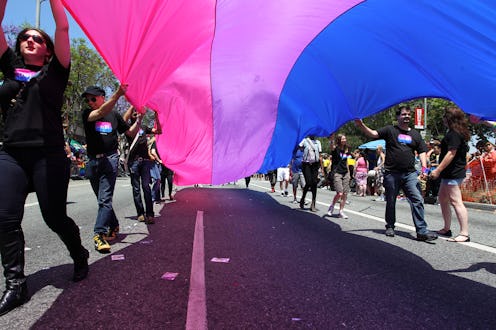Life
Why Bi Visibility Day Is Still So Important In The Fight Against Erasure

For the last 20 years Bisexual Visibility Day has been celebrated on Sept. 23. It's such a great excuse to reflect on the progress that’s been made in the LGBTQ+ community in the UK, while raising the profile of bisexual campaigners, artists, writers, and those working to make society a better place. However, when you’re faced with pretty offensive stereotyping or worse it makes you wonder how accepting society really is of bisexuality. So here’s why Bi Visibility Day is still important.
LGBTQ+ may be a really handy acronym for referring to a non-heterosexual community but that also suggests there’s one community and one lesbian, gay, bisexual, trans, or queer experience. While I’m sure it’d be nice to all meet in one place to have a cup of tea and discuss the agenda, this couldn’t be further from the truth and the reality for so many people is bisexuality is often forgotten or erased in LGBTQ+ culture.
Bi Visibility Day highlights all of the amazing things that bisexuals around the world are doing but also the stereotyping that's perpetuated in pop culture, workplaces, homes, and friendship groups. Because of "passing privilege" (the idea that a bisexual people can pass as heterosexual by being in a romantic relationship with someone of a different sex) we’re often treated as not being gay enough for the queer community and not straight enough to be heterosexual. So, where does that leave bisexuals?
I can’t imagine a summer without Pride and September with Bi Visibility Day. However, the first Bi Visibility Day was observed at the International Lesbian and Gay Association (ILGA) conference in Johannesburg in South Africa in 1999. Not that long ago when you think about it. Since then it’s grown into a celebration of all things bi. According to the Office of National Statistics 0.8 percent of Brits identify as bisexual so there’s a lot of us out there.
In my own dating experience people have been way too comfortable with their biphobia. While sexuality is fluid and you don’t have to label yours if you don’t want to, to have part of your identity thrown away as a phase isn't acceptable.
Biphobia is a double edged sword. I’ve had lesbians tell me that they can’t date me because I’m probably testing the water and will just go back to dating men. I’ve also had straight men tell me they can’t date me because I’ll run off with a woman or, even worse, I can kiss other women because that’s “not really cheating.” My success on tinder increases exponentially when I remove “bisexual” from my bio and when it’s in there it seems to be a call to all the couples out there looking for a third.
Presenting bisexuals as greedy, indecisive, disloyal, or promiscuous delegitimates bisexuality all together. And just because early 2000s TV taught you that girls kissing girls is for men's satisfaction alone doesn’t mean that’s actually the case. I’ll steal your girlfriend and then we’ll talk about how 'real' female bisexuality is.
But the erasure of the experiences of bisexuals runs deeper than just stereotyping. Research published by Stonewall in 2018 found that 46 percent of bisexual men and 26 percent of bisexual women aren’t open about their sexual orientation with anyone in their families. This is compared to 10 percent of gay men and five percent of lesbians. Stonewall also found that 38 percent of people who identify as bisexual aren’t out at work for fear of discrimination. According to the Office For National Statistics, bisexuals are likely to suffer from a higher level of anxiety and are 40 percent more likely to describe themselves as unhappy than other sexualities.
While negative stereotyping, stigma, and discrimnation definitely play their part in this, it could also have something to do with the fact that bisexuality is frequently silenced and hidden in daily life. This is also known as bisexual erasure. In order to be out and proud there has to be a common language and examples in pop culture for bisexuals to use. I remember turning on The L Word for the first time as a teenager and having my queer mind blown. Not only were there other women out there who dated both men and women, but sexuality wasn’t so black and white. This made coming out to my parents years later so much easier.
Visibility and representation are important because they let people know that they’re seen, that they're normal, and that there’s a community out there for them, both within the LGBTQ+ community and with straight allies. Lesbian, Gay, Trans, Bisexual, and Queer experiences are far from identical and Bisexual Visibility day recognises the uniqueness of bisexual experiences, including all the amazing things, but also the areas that still need work. Navigating your sexuality can be hard, and for some people it’s something that takes a lifetime. However, if representation of bisexuality in the media, on TV, and in the way that bisexuality is spoken about isn't accurate, it makes coming out so much more difficult and can erase bisexuality all together.